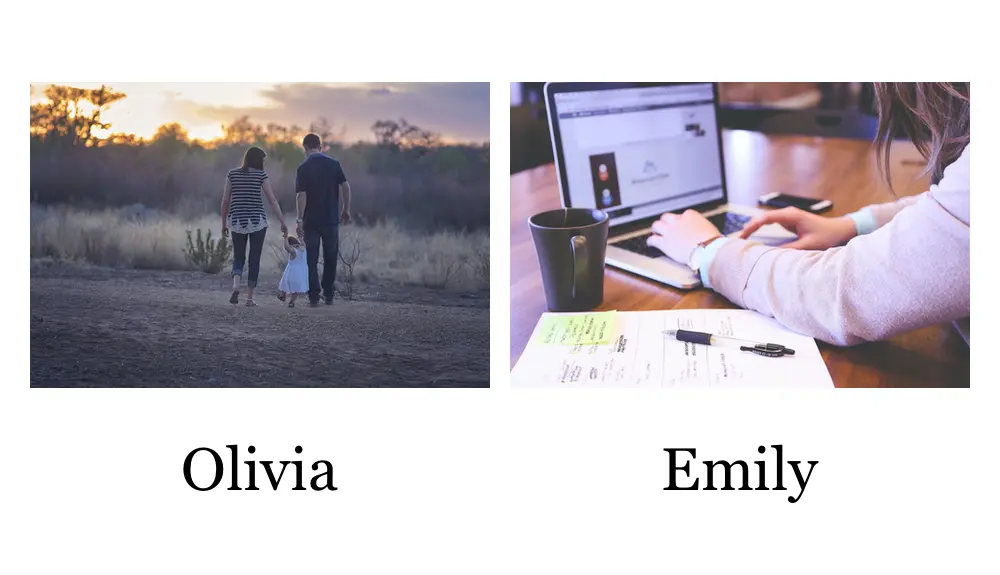Olivia & Emily
The stereotype of the Swiss investor has changed. It’s no longer necessarily a guy in a well-tailored suit who knows his way around thanks to his job in finance in Geneva or Zurich. With the advent of the internet and access to information, investors now come from all fields of activity, all age groups, and all geographical areas (including the Vaud and Appenzell countryside!).
Although we are different in our lifestyles and speak a different language on each side of the Röstigraben, we are all basically the same. We all want to see our money grow, we all fear the next crisis, and we all go through the same mistakes (such as thinking that this action is really a good plan).
In talking with many readers interested in personal finance since the blog’s launch in 2014, I realized that I could associate each of them with one of two stereotypes: the visionary and the factual.
Let’s call them Olivia and Emily.
Initially, both in their early twenties, they look pretty much the same.
Olivia wrote to me: “I want to be the master of my time and have the luxury to do what I love without feeling constrained by money. Also, when I have children, I want to be able to spend time with them whenever I want (it’s a bit of planning ahead, but if you don’t plan ahead, you’re actually planning to fail!). Creating options for myself, that’s why I want to start investing.”
Emily, on the other hand, was explaining to me: “I want to start investing because I want to achieve financial independence as soon as possible, within 10 years at the most. My goal is to be able to use my time to build a side business without worrying about having enough money to pay my bills/accommodation, nor living under the pressure of the immediate performance of the cash flow generation. The business in question is quite creative, so I need to be clear-headed about any pressure to ‘produce’. To sum up, I want to stop working for a living and work on things that make me happy.”
When I asked them the reasons “why” they didn’t start investing at the time, here are their respective answers:
- “Investing in the stock market is like Chinese for me. And I have a rather negative view of it. It seems out of my control, because mastering it takes some skill. And to know what to do, you have to find the right information. And there’s too much information on the internet and I don’t know where to start. It’s not as if I also have a full-time job on the side…” (Olivia)
- “I know how to save money, but I don’t know how to manage it intelligently afterwards. Because keeping it in a bank account (with their ridiculous rates) or under the mattress aren’t the best solutions, right ;)” (Emily)
Ten years later
As we said before, same wishes and same blockers. What sets them apart is what their lives look like ten years later.
| Olivia | Emily |
|---|---|
| Think 30min/day about her investments | Spends 30min/quarter on her investments |
| Stressed out when she hears the word “stock market” | Zen when she hears the word “stock exchange” |
| Net worth : CHF 121'400 | Net worth : CHF 212'890 |
Ten years later, Olivia thinks about 30 minutes a day about her investment choices. As soon as she hears the word “stock market” on TV or in a chat with friends, she feels a certain amount of stress rising. Her invested assets amount to CHF 121'400, of which CHF 2'000 is invested in gold. The rest is in a savings account.
Emily, on the other hand, spends only 30 minutes a quarter on her investments. She is completely zen if she hears the word “stock market” on the Téléjournal when she visits her grandmother. The value of her investment account is CHF 212'890.
How could they have evolved so differently in a decade? To answer this question, let’s go back in time…
10 years earlier…
Olivia is on her couch, scrolling on her smartphone. She can’t stop thinking about the lunchtime chat she had with her colleagues at the office. John, her team leader, explained that all the rich people in his surrounding were investors. He explained that he had just heard from a Swiss startup in MedTech (i.e. medical technology). that had just gone public. And that this was something not to be missed.
Olivia saw it as a sign.
She had always heard her father say that you have to invest to see your money grow. She had started transferring CHF 100 a month into an investment account at her cantonal bank to get her feet wet. She was proud to have taken the plunge because although it didn’t pay so much, she still received a few dozen francs a year in dividends without doing anything.
“Maybe it would be a good time for me to started for good, on my own… “ she thought. She decides to do some Google searches that night.
She reads everything she can about this famous MedTech startup and what an online broker is. She then calculates how much she could save per month in addition to her actual CHF 100 without having to change her standard of living either. Once she has all this written down on her notepad, she feels confident. She finally has a plan of action.
She decides to take the plunge and opens her online brokerage account the next day.
The excitement of taking action…
Olivia wastes no time and as soon as her investment account is opened, she transfers CHF 10'000. She decided to invest CHF 7'500 in the famous startup. For the remaining CHF 2'500, she chose to invest it in Nestlé after seeing in the newspaper Le Temps that the company should continue to thrive again this year with the Asian market flourishing.
Since she doesn’t want to lose money, Olivia imposes herself the discipline to follow the evolution of the stock market every morning. The first few months, the MedTech nugget is doing well as its products are starting to sell in the US as expected. Nestlé, on the other hand, is below its announced quarterly results due to the changes in the Chinese government that took place two weeks after Olivia started. The share price has fallen 6% and Olivia is starting to feel anxious. She follows the Agefi and RTS sites at lunch and dinner to keep up to date before deciding what to do.
Three years later…
Olivia is increasingly stressed by stock market movements. Her shares are now worth only CHF 35'000, whereas she invested CHF 43'200.
Nestlé has kindly regained some of its initial value compared to when Olivia started to invest. But it’s the MedTech startup that’s causing her the most trouble. In the last quarter, she sold all her shares at CHF 5.90 following the recommendations of her manager John, who knows the field well. Then she bought back twice as many shares the following week at CHF 4.92.
“What a masterstroke!” she congratulated herself.
Except that two weeks later, the coronavirus crisis hit the global economy hard. All the capital rushes to big pharmaceutical companies hoping to hit the jackpot with whoever finds the vaccine. Her MedTech startup doesn’t recover and goes bankrupt. Luckily, she was able to sell her shares just before, but at less than CHF 1/share…
She’s also getting all her savings out of Nestlé before it gets any worse.
Olivia realises that she doesn’t have the skills to find the right nuggets (nor does her manager John for that matter). She will have left more than three quarters of her savings there.
The following Sunday, she tells her father about her misadventures. The latter is quite understanding because he made the same mistakes in his youth. He explains to her that he now invests only one or two tenths of all his savings through the advice of his banker, Jacques, who knows about stock market. And the rest he keeps in his savings account because it’s safer.
On the doorstep as she says goodbye, her father offers to put her in touch with Jacques so that the latter can manage his investments as he does with him.
Two months pass when Olivia finds herself for the nth time with her eyes riveted on her e-banking and the meagre savings she has left.
She can’t help thinking that this Jacques, a lifelong employee of his cantonal bank, is a bit old-fashioned. At least, that’s the image she had of him when she heard her father talk to him about conservative strategies, and not putting her eggs in the same basket.
So she starts looking on the web for a financial institution that could accompany her. As she wandered around, an ad from SC (one of the two big Swiss banks) caught her attention thanks to its well-honed marketing that answered Olivia’s fears. Moreover she can make an appointment online until 8pm.
“Finally a bank that understands my schedule!” she says to herself.
The online appointment is made for the next day. The counselor is pretty young. She feels confident. He explains the importance of diversifying his assets with numbers to back it up. He offers her a portfolio of 7 SC funds all managed by the bank in Switzerland.
He goes on: “The stock market is a very volatile thing so we try to hire the best analysts in the business to have funds that are always up to date with what’s going on in the world.”
Olivia is convinced. She makes an appointment at the agency to finalize the signing of the contracts the next day.
The appointment that hurts
It is now three years since Olivia entrusted the management of her savings to SC. As every year, she has an appointment in February with her advisor at the Lausanne branch office to review the situation. Until now, she has always come out of this meeting with a smile on her face, as she has been generating a return, albeit a moderate one, which corresponds to her risk profile. Above all, it no longer prevented her from sleeping and no longer required constant monitoring of the stock market.
Except that this morning, his counselor had a dark look on his face in his suit. He tells her that the stock market has fallen significantly, but that she still should wait before getting out. Olivia is feeling the same tummy ache she felt several years earlier when her MedTech startup went bankrupt.

Even if he is sad for Olivia, the banker remains happy because he will be able to buy his Porsche with his end of year bonuses (thanks to the SC funds!)
On her way home, she starts going through her portfolio report. It’s the first time she looks at it in detail, because before, everything was fine…
She discovered with amazement all the fees charged by SC Bank and its funds. She pulls out her calculator and realizes that without them, she would be at +0.02% performance. And not at -2.6%. She has the impression of having been trapped because she would have earned more by leaving it on her savings account…
In order not to be fooled by the fine words of her banker, she decides to send him a transaction order by email:
Dear Mr. Henri, I would be grateful if you could sell all my SC funds and transfer the money from the sale to my savings account. Afterwards, I would like to invest CHF 2'000 of those savings in gold. Thank you for your understanding. Olivia
Then she vows never to buy anything on the stock market again.
Emily takes a completely different approach…
Emily also discussed with a group of friends that all the financially comfortable people in her circle were investing, but compared to Olivia, she takes a factual rather than a visionary approach. She knows that the millionaires who were overnight millionaires during the dotcom bubble, the ones everyone thought were visionaries, were the ones who had nothing left the day after tomorrow.
Access to economic information was previously reserved for the financial caste. And unless she had a few million dollars in the bank, Emily, as a private investor, had no access to it. Except the world has changed…
With the advent of the Internet, all this information is now accessible to ordinary people. Most stock market information is available on sites such as Yahoo Finance or Seeking Alpha. Many quality blogs and forums are there to help the neophytes. Warren Buffett’s annual letters are shared on social networks. Communities are formed around famous investors such as Jack Bogle, founder of the Vanguard group. And that’s not to mention the financial popularization books that anyone can buy on their Kindle via Amazon.
On top of that, access to the stock exchanges is also greatly facilitated. It is now possible to invest from CHF 1 in two or three clicks from your sofa.
Thanks to digitisation, costs have been reduced at all levels. In terms of portfolio construction, a single pot of shares that can be bought on the stock exchange (known in the financial world as an ETF for “Exchange Traded Fund”) is all you need to be sufficiently diversified.
Emily stumbles upon something interesting while she’s in the ICN train for Zurich for a business meeting. An American personal finance blog mentions Standard & Poor’s : “After 10 years, 85% of actively managed large-cap funds have underperformed the S&P500, and after 15 years, nearly 92% are lagging behind the index. Even including crisis years such as 2008-2009, which were supposed to be the years when active managers would beat the indexes.”. Even Warren Buffett seems to confirm this according to an interview on CNBC: “A low cost fund is the smartest equity investment for the vast majority of investors. My mentor, Benjamin Graham, took this view many years ago, and everything I’ve seen since then convinces me that he was right.
“Eureka!” she exclaims inwardly. Investing in a complex manner does not guarantee success. On the contrary, it’s investing in a simple way that seems to win every time!
Simplicity and passivity are the keys to a successful investor, but please without too many fees!
Emily knows that these days all the news channels and marketing of financial institutions are trying to attract the attention of investors. This, in order to line their pockets. Not hers.
And that’s what is most difficult as an investor at the end of the day: not believing that wealth comes overnight, and moreover with a free lunch. Because all the data shows that this is impossible. So we must not allow ourselves to be lured by these vain temptations.
The only strategy that has proven successful so far, for us ordinary Swiss investors (i.e. who do not have a Master’s or PhD in finance), is the following:
Start today
Long-term vision (10-15+ years)
Buy and hold without reselling
Diversify through funds
Keep costs to a minimum via index funds
Invest regularly (monthly or quarterly)
Growth strategy vs. dividends (because of Swiss taxation)
Understand what you’re investing in
Compared to Olivia who follows her instincts according to the discussions she hears, Emily defines an investment strategy based on historical data validated by the greatest investors of our era such as Warren Buffett and Benjamin Graham.
Six years later, Emily saw her portfolio grow steadily. Of course, it has been very volatile during the last crisis with -40%. But Emily, true to her factual strategy, has ignored it. She kept her investments, for the best in the years that followed.
Her dream of financial independence is fast approaching. All the evenings that she doesn’t spend watching over and looking after her investment portfolio, she spends them setting up her creative business that is so close to her heart.
Conclusion
The difference between Olivia and Emily is not a difference in particular financial skills, but a difference in mindset.

That's how I picture the brains of each of our heroines — which also resembles their respective visions of the stock market...
Olivia is acting like a conservative visionary. Visionary because her mix of attentional bias and illusory superiority pushes her to buy what she hears about, thinking that she will be the only one to see potential in an opportunity, like her MedTech startup. And conservative at the same time because her fear of loss will make her sell it all at the worst possible time.
Emily, on the other hand, acts like a factual person who knows her own biases.
The factual investor is also often known as the boring investor (to himself and others).
She is guided by concrete and statistically proven data. Once she has sufficient converging information, confirmed by financial authorities, she establishes a strategy from which she no longer deviates.
Most investors start out as Olivia and end up as Emily.
I’ve also been an Olivia, a visionary wait-and-see type. I also saw Apple’s stock price at 30 USD go above 90 USD between 2009 and 2012, and thought I should go for it because it was sure to go above 100 USD one day. Except that I never took action (Apple’s share price is in 2020 at 245 USD in the middle of the coronavirus crisis).
Same with Bitcoin where I thought it was the future. I waited and waited. “What? “ you ask me. The right time of course! Except that then I went for it, but at the worst possible moment, that is to say at the top of a peak before it went down.
It took me about six years to go from Olivia to Emily, and there has been no turning back since. Well almost (see my recent P2P lending experiment), because I’m still human with my biases.
Consciously recognizing that one is one’s own worst enemy is the key to long-term success as an investor.
We all have a choice
If you behave like an Olivia, then you have a choice to make: red pill or blue pill?
You take the blue pill, the story ends. You wake up in bed and you believe what you want to believe. You take the red pill, you stay in Wonderland, and I show you how deep the rabbit hole is. Remember, all I’m offering is the truth. Nothing more.Morpheus, Matrix
Next step
Olivia, not Emily, is the hero of our story. Click on the button below to read about Olivia’s transformation from visionary investor to factual, boring, successful investor.

